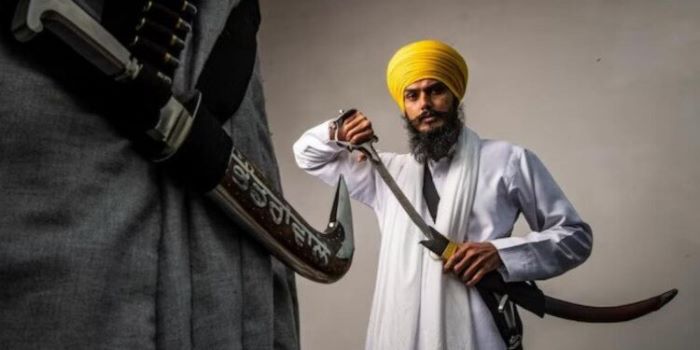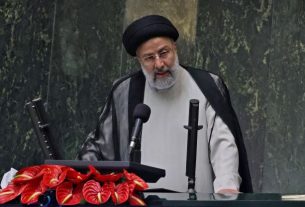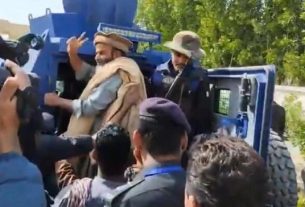As the political pot boils in India’s Punjab, this Indian state is making global headlines. Echo for a separate Sikh state of Khalistan can be heard yet again from rural pockets of the state. Amritpal Singh, self-styled Khalistan leader, is the latest mascot, giving a new lease of life to the separatist movement that had been dormant for over two decades.
There exists a vacuum in the political demography of Punjab. The aspirational youth has lost hope and connect with the ruling class. And amid the numerous crises that Punjab is reeling through, Amritpal Singh has suddenly surfaced on the scene and is calling for a revolutionary change in the state politics, speaking on the issues of drug menace, unemployment and agrarian crisis, and raising the demand for state autonomy. He has caught the pulse of Punjab, bringing the state almost to an edge yet again.
Militancy in Punjab that was nipped into the bud in the 1990s appears to have surfaced again with Singh, whose appearance and oratory is a reminder of 1970s and 1980s, when the radical forces were at its peak in the state under the leadership of Jarnail Singh Bhindranwale.
But the sudden rise of Singh has left many questions unanswered. At age 30, Singh is a young man, who till a few months ago did not even wear a turban. He was running a transport business in Dubai along with his father and was active on social media platforms, extending support to farmers of Punjab during the farmer protest of 2021 and other Sikh issues.
He landed in Punjab last year in August. In September, he got baptised at the holy Anandpur Sahib Gurudwara, where the tenth guru, Guru Gobind Singh, baptised him for the first time and laid the foundation of Khalsa. About 600 people attended Singh’s baptising ceremony. Next he was seen at Rode village, the birthplace of Bhindranwale, who had led a radical movement for establishment of a separate Sikh state during the 1970s and 1980s.
Singh was seen dressed in a robe like Bhindranwale, he wore the turban in his style, carried a sword and spoke in the same fashion as Bhindranwale. He soon emerged as a hardliners Sikh separatist campaigner. More than 7000 people were present at the site when Singh spoke at Rode, raising concerns about his swift rise in popularity.
Singh took over the organisation Waris Punjab De, which was floated by Punjabi actor Deep Sidhu during the farmer agitation in 2021. Sidhu died in a road accident last year, leaving the group headless. Amritpal Singh made an announcement declaring him as the new chief of the organisation – and led his campaign in Punjab under this umbrella. Members of Sidhu’s family refused to accept Amritpal Singh’s leadership but the dissenters have been kept at bay. In no time, Amritpal found support in the disgruntled Sikh youth of Punjab. Khalistan flags, posters and banners, demanding Khalistan yet again began to resurface.
Mohananey further added that peace at the Indo-Pak border leaves little room for the BJP
to replay the old script on Pakistan. “Backed by the United States and brokered by the
United Arab Emirates, the ceasefire on the international border and Line of Control
with Pakistan in Jammu and Kashmir still holds and
there is so far no excuse to call it off.”
Unexplained Silence Of The Government
In February, Singh threatened Indian home minister Amit Shah. He said that if Shah tried to hinder the Khalistan cause, he would meet the same fate as that of late Prime Minister Indira Gandhi. Her Sikh bodyguards assassinated Gandhi after Operation Blue Star and attack on the Golden Temple that led to killing of Bhindranwale and curbing of the Khalistan Movement.
While Amritpal Singh made headlines, the home minister and the government of India looked the other way. The security agencies are learnt to have apprised the home ministry about the foreign funding received by Singh.
On March 3, Waris Punjab De demanded the release of Amritpal’s aide Lovepreet Toofan from Ajnala police station in Amritsar. It created a serious law and order problem in the state. Thousands of Amritpal Singh’s supporters gathered outside the police station, demanding the release of Toofan, who was arrested on charges of kidnapping and murder. The crowd carried the holy Guru Grant Sahib as a shield to avoid action from the police.
Later, when the police got into action and launched a massive crackdown to arrest him, Singh evaded arrest and reportedly travelled from Punjab to Haryana to Uttarakhand, and continues to be on the run. Only on March 21, the government put the Border Security Force on alert, suspecting that he might try to cross the border.
Questioning the manner in which the Punjab as well as Central government have navigated through the whole episode, Avinash Mohananey, retired Director General of Police, in an article titled Why is Khalistan dominating the media narrative? Wrote: “ What happened in Ajnala Police Station was simply a law and order issue that could have been effectively dealt with, at the level of the police station or at the most superintendent of police.”
Meanwhile Punjab continues to remain on high alert. Security forces took out flag marches in several places, including Ferozepur, Bathinda, Rupnagar, Faridkot, Batala, Fazilka, Hoshiarpur, Gurdaspur, Moga and Jalandhar. Orders have been issued banning assemblies across Punjab and Union territory of Chandigarh. Punjab police has made more than 300 arrests. Four of Singh’s close associates have been flown to far off Assam jail, raising concerns over the difficulty that the local police will have to face, in interrogating them.
Khalistan today is a media creation. While the Indian media houses may be blaring day and night about the revival of Khalistan in Punjab, the reality on ground is in complete contrast. “Khalistan is not a phenomenon in Punjab anymore. The Sikhs have realised that killings and blood bath is going to do no good. Barring a handful of youth in the rural pockets, no one wants Khalistan,” explained political scientist Balkar Singh.
He further added that the idea of Khalistan finds support only in the Sikh diaspora based at the UK, Canada and Australia – “They are the ones who have lent support to Amritpal”.
Sikh observers also feel that demand for Khalistan has no place in Punjab anymore. Punjab blames the centre for raking up the Khalistan issue time and again. “Even during the peaceful farmer protest, the Central government and media houses in Delhi claimed that Khalistan supporters were backing the protest. But could they find any evidence? The government of India time and again raises the Khalistan issue to deviate from other important issues,” added the professor.
Punjab since the time of the country’s independence has received a stepchild treatment from Delhi. From the time when the promised autonomy was denied to Punjab by the Constituent Assembly, to the struggle for separate Sikh state, water dispute with the state of Haryana, to recent agrarian crises, Punjab has not gained sympathy from the Centre. “Past incidents have made Punjab a politically mature state. The government has failed to get hold of one man. It has left many questions unanswered,” says Professor Kehar Singh of Patiala University. Calling it a trap to dent the image of Sikhs, the head priest of the Akal Takah, Giani Harpeet Singh said, “The events that have unfolded in the state could have been handled at the local level by the state police. But the whole issue was blown out of proportion, just to give a negative message about the Sikh community.”
Sikh observers also feel that demand for Khalistan
has no place in Punjab anymore. Punjab blames the centre
for raking up the Khalistan issue time and again.
Fugitive Amritpal Singh Loses Popularity
Amritpal Singh’s sudden disappearance from the political landscape of Punjab has been as swift as his arrival. Not only has he lost credibility among his Sikh supporters, but the way the sequence of events have unfolded have exposed many security lapses.
“In Punjab, Amritpal’s fall in popularity was steeper than his rise. Sikhs have a very high self-respect. The way Amritpal has left the fort and is hiding like a fugitive has discredited him in Punjab,” added Professor Kehar Singh. While Singh was trying to project himself as the next Bhindranwale and the champion for the Sikh cause, the manner in which he has escaped arrest and has shown his back to the people, who had pinned their hopes on him, has made his narrative weak.
Unexplained Government Silence
The untimely action of the police and other security agencies and the way the whole crisis has been handled by the government also raises questions on the role and intent of the government.__The Friday Times





